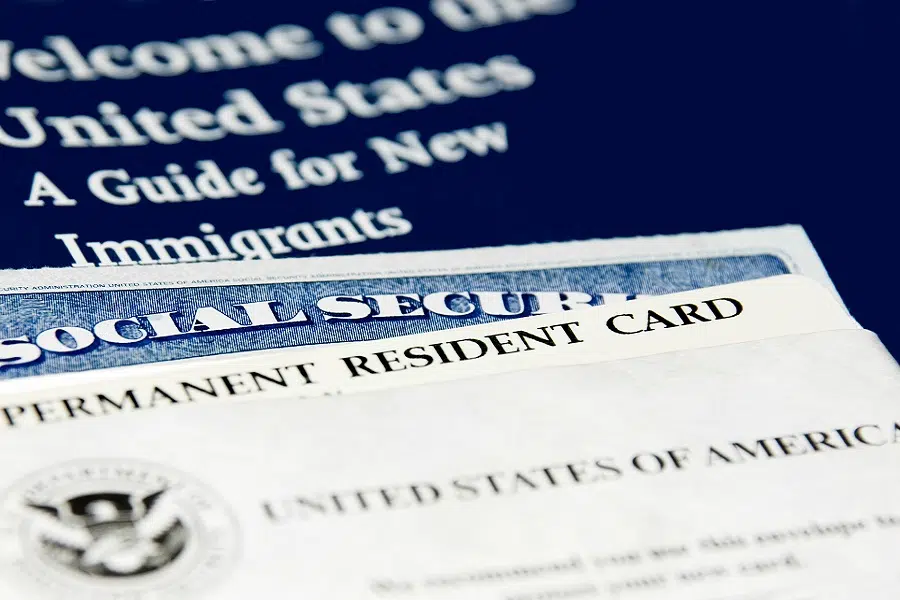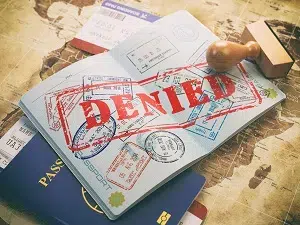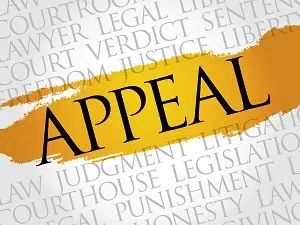A Houston Immigration Appeals Lawyer Fights Denied Petition
Key Takeaways:
If your immigration petition is denied, you may still have options. A Houston immigration appeals lawyer can help you respond to a Request for Evidence (RFE) or Notice of Intent to Deny (NOID), file an appeal with USCIS, the AAO, or the BIA, or even challenge the decision in federal court. With tight deadlines and complex rules, having legal guidance improves your chances of success and gives you clarity throughout the process.

A Houston immigration appeals attorney is your ally when a petition gets denied. If you’re facing a rejection from USCIS or an immigration judge, you’re not out of options. With professional guidance, you may still be able to turn the situation around.
Immigration denials are frustrating, but they don’t have to be the end of the story. An appeal allows you to address the issues behind the decision and show why your case deserves a second look. Below, we’ll explore common reasons for denials, how to respond to RFEs and NOIDs, what it takes to file an appeal, and what to do if your case is rejected again. You’ll also learn how working with a trusted immigration appeals lawyer in Houston can change the course of your case.
Why Immigration Applications Get Denied
Receiving a denial on your immigration application can be frustrating. After all the time, money, and hope you’ve invested, a rejection letter may seem like the end of the road. But in many cases, denials happen because of specific, identifiable issues, some of which can be fixed or challenged with the right support.
One of the most common reasons for denial is insufficient evidence. USCIS and immigration courts require thorough documentation to prove eligibility for benefits like a Green Card, Visa, or citizenship. If your application lacks key documents, such as financial records, proof of relationship, or medical exams, it can be denied simply because the agency couldn’t verify your qualifications.
Missed deadlines are another frequent issue. Immigration agencies operate under strict timelines. Your case could be rejected without further review if you fail to respond to a request for evidence, submit your application late, or miss a required interview.
Sometimes, applicants are denied because of eligibility problems. Each immigration benefit has its own rules. For example, applying for a family-based Green Card requires a qualifying relationship with a U.S. citizen or lawful permanent resident. If your application doesn’t meet those criteria or if you applied under the wrong category, a denial is likely.
Finally, inadmissibility factors like past immigration violations, criminal convictions, health issues, or financial instability can also lead to denial. These red flags raise concerns about whether you qualify under immigration law.
No matter the reason, a denial can impact your ability to work, remain in the U.S., or reunite with your family. But it’s not always final. Identifying the problem clearly and taking the right steps quickly can open the door to an appeal or reapplication. A skilled Houston lawyer for immigration appeals can help you understand exactly what went wrong and how to fight back.
What To Do If You Get An RFE Or NOID
If USCIS has questions or finds gaps in your application, they may issue a Request for Evidence (RFE) or a Notice of Intent to Deny (NOID). These are critical opportunities to strengthen your case and avoid an outright denial.
Request For Evidence (RFE)
An RFE means USCIS needs more documentation to make a decision. They haven’t rejected your case, but they need clarity. Common triggers include:
- Missing financial documents.
- Incomplete biographical details.
- Weak proof of a qualifying relationship.
Review the RFE carefully to understand what’s missing. Then submit a timely and complete response. Accurate, organized documentation can keep your case alive. If you’re unsure how to respond, an immigration appeals attorney in Houston can step in to help build a stronger submission.
Notice Of Intent To Deny (NOID)
A NOID is more serious. It signals that USCIS intends to deny your application based on current findings, but they’re giving you a chance to respond. You must submit compelling evidence to overturn that decision.
Reasons for a NOID often include:
- Discrepancies in documents.
- Concerns about fraud or misrepresentation.
- Missing eligibility criteria.
Marriage-based petitions, for example, often get NOIDs when USCIS doubts the authenticity of the relationship. A well-prepared response, complete with affidavits, documentation, and legal argument, can shift the outcome. A Houston immigration appeals lawyer will know how to address USCIS’s concerns and respond persuasively.
Can You Appeal An Immigration Denial?
Yes, and often, it’s worth it. But not all cases qualify for appeal, and each option has specific procedures and deadlines. The first step is understanding why your petition was denied.
USCIS Appeals Process
If USCIS denied your case, you may be able to appeal to the Administrative Appeals Office (AAO). This process involves filing Form I-290B within 30 days of the denial. Your appeal should include:
- A detailed explanation of why the decision was incorrect.
- Any new or overlooked evidence.
- Legal arguments to support your eligibility.
Filing an appeal is not a chance to re-argue the same facts. You need to identify legal or factual mistakes in the original decision, or present new documentation that changes the picture. This is where working with a Houston lawyer for immigration appeals is especially valuable.
Administrative Appeals Office (AAO)
The AAO handles appeals for cases involving employment-based Visas, waivers, and special immigrant petitions. When you appeal to the AAO, your case is reviewed by a different officer who checks whether the law was applied correctly.
Timelines vary, but most decisions take several months. Submitting a strong brief and a well-organized evidence packet increases the chances of success.
Board Of Immigration Appeals (BIA)
If your case involves removal or was decided in immigration court, your appeal goes to the Board of Immigration Appeals (BIA). The BIA reviews decisions made by immigration judges.
To begin the process, you’ll file Form EOIR-26 (if appealing a judge’s decision) or Form EOIR-29 (if appealing a USCIS officer’s decision). You typically have 30 days to act.
The BIA examines whether the judge correctly applied the law. A persuasive legal brief can make or break your appeal. The guidance of a Houston attorney for immigration appeals helps ensure that your arguments meet legal standards and respond to every point raised in the initial decision.
What If The Appeal Is Denied?
Even if your appeal is denied by the AAO or BIA, you still may have options.
Federal Court Appeals
A federal court appeal is not a chance to submit new evidence. It’s a legal challenge that focuses on whether the agency or the immigration court misapplied the law.
The U.S. Court of Appeals can reverse a BIA decision, order further review, or affirm the denial. But federal appeals are complex. You’ll need to argue legal errors, such as incorrect interpretation of immigration statutes or denial of due process. Success depends on deep legal knowledge and strategy, which is why working with an experienced attorney for immigration appeals in Houston is essential at this stage.
Supreme Court Review
Taking a case to the U.S. Supreme Court is extremely rare and only an option when the case presents significant constitutional or legal questions. Most immigration cases do not reach this level, but it remains a possible path for a small number of litigants.
A denial, even from the BIA, doesn’t necessarily mean the end of the road. Knowing how to navigate these next steps gives you the best chance of staying in the U.S. and achieving your immigration goals.
Why You Need A Houston Immigration Appeals Lawyer
Immigration appeals are dense with legal procedure, deadlines, and documentation. A missed step or weak argument can close the door for good. That’s why partnering with a skilled Houston immigration law firm can change the outcome.
Here’s how a lawyer can support your appeal:
- Case evaluation: Identify legal and factual errors in the denial.
- Evidence gathering: Organize and submit documents that prove your case.
- Legal writing: Prepare compelling arguments in your appeal brief.
- Representation: Communicate with immigration authorities and represent you in hearings.
It’s easy to overlook critical details or misinterpret the legal reasoning behind a denial without professional help. A Houston lawyer for immigration appeals brings clarity and direction at a time when the stakes are high.
Your Trusted Partner For Immigration Appeals
At Houston Immigration Lawyers, we understand that immigration appeals are personal. Every case represents a family, a career, or a future at risk. Our job is to bring experience, precision, and compassion to every appeal we handle.
From the moment you contact us, we make sure you understand your rights and options. We take the time to explain every step and answer your questions. Then we build your case with care, tailoring our strategy to your unique situation.
Whether you’re facing a USCIS denial, appealing a removal order, or considering a federal court challenge, we’re ready to help. We’ve worked on appeals at every level, and we know what works. Let our team take the lead so you can focus on moving forward.



